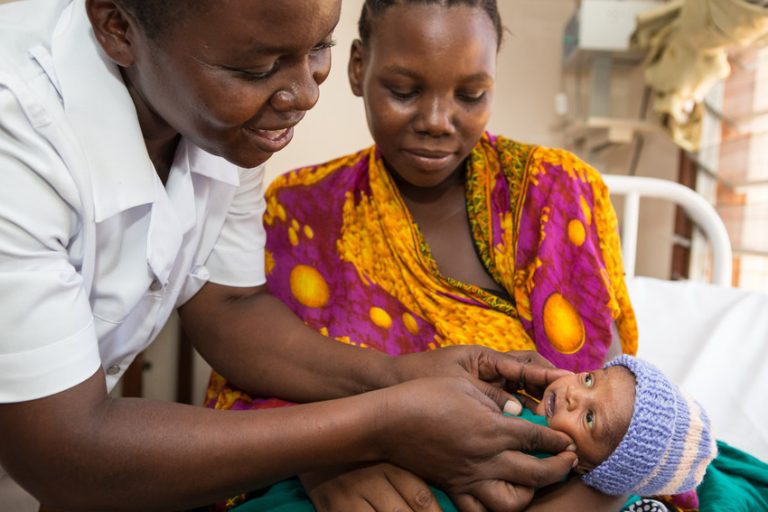Originally published on Save the Children UK website
TODAY, INTERNATIONAL DAY OF THE MIDWIFE CELEBRATES THE ESSENTIAL ROLE THAT MIDWIVES PLAY, ALL OVER THE WORLD, IN ASSISTING WOMEN AND THEIR NEWBORN DURING PREGNANCY, CHILDBIRTH AND THE POSTPARTUM PERIOD.
Hundreds of thousands of women still die every year due to complications in pregnancy and childbirth – an estimated 830 women a day. And despite a significant decline in under-five mortality worldwide, there were an estimated 16,000 child deaths, every day, in 2015. Over 45% of these deaths occur in the newborn period (from 0 to 27 days). Many of these deaths could be prevented with more recognition of, and investment in, midwifery as a key cadre of health professionals who can provide a range of vital health interventions for women and newborns.
In 2014, The State of the World’s Midwifery report called for an urgent investment in high-quality midwifery to prevent about two thirds of all maternal and newborn deaths. Properly trained, equipped, supported and regulated midwives can provide 87% of the essential care needed by women and newborns.
 Nurse and midwife Claire had training supported and facilitated by Save the Children in Kenya
Nurse and midwife Claire had training supported and facilitated by Save the Children in Kenya
In 2014, The Lancet series on midwifery highlighted its critical role in the realization of women’s and children’s right to health and in reaching the SDG goals on eliminating preventable maternal and child mortality and on Universal Health Coverage (UHC). It also highlighted the need to integrate midwives in multidisciplinary health teams across care settings, from health facilities to the community, and to recognize the health, social and economic benefits of their profession.
There is a core set of essential competencies of midwifery practice that are recognised globally, and to be called a midwife someone must have mastered these. In some countries the role has been expanded to include family planning and reproductive health services or specific emergency procedures, for example. There is also increasing recognition of the importance of post-natal care in the prevention of neo-natal deaths and of the role that midwives can play in delivering routine care such as the promotion and support of breastfeeding and, as well as of their role in the treatment and care of small and sick newborns.
With maternal mortality still unacceptably high and newborn deaths forming such a high proportion of under-five mortality, the role of the midwife in averting these deaths is crucial. Midwives can provide women-centered care which takes into account women’s rights, views, expectations and individual needs. This should be part of a continuum of integrated care that responds to women’s needs and also mitigates against unnecessary interventions and over-medicalization.
According to WHO, UNFPA and the International Confederation of Midwives, only 22% of countries with the highest burden of maternal and infant mortality have enough adequately educated and trained midwives and 78% of countries face serious shortages in midwifery personnel.
In addition to shortages in this section of the health workforce, a survey of midwives from 93 countries carried out last year revealed the many challenges facing midwives in their profession. These range from poor working conditions and lack of professional recognition, training, support and opportunities, to inadequate and irregular pay, to difficulties in making their voices heard in policy dialogue and at the decision-making table. With the majority of midwives being women, gender inequality and discrimination was also identified as an issue, as well as harassment at work, a lack of security and fear of violence. Many combine their professional work with other family and caring responsibilities in their community, placing a huge burden in their ability to deliver quality care effectively.

AT SAVE THE CHILDREN IMPROVING TRAINING AND SUPPORT FOR MIDWIVES IS A KEY PART OF OUR WORK AND STRATEGY
In Kenya our Maternal and Newborn health programme “Boresha” is working in partnership with the Ministry of Health, supporting students in their initial training in midwifery and for those already qualified providing support through training in emergency obstetric and newborn care, innovative mentorship packages and supportive supervision.
In Nigeria we are part of a consortium project called ‘Women for Health’. In the North of Nigeria it can be difficult for a woman to seek care from a male health provider so we are focusing on supporting girls and young women to get the qualifications they need to enter midwifery training, and working with educational institutes to improve the quality of midwifery training. Newly qualified midwives working in rural and remote areas also need additional support to help in the transition from student to practitioner.
These two programmes highlight important areas that need addressing if women and babies are to get the care they need. More midwives are needed so there is need to invest in initial training then once qualified midwives need support to enable them to do their job, to continue to learn, maintain and build their skills. There are many promising opportunities that could bring real improvements.
IN JULY THIS YEAR, THE ICM TRIENNIAL CONGRESS WILL BRING TOGETHER MIDWIVES AND OTHER HEALTH PRACTITIONERS AND ADVOCATES FROM ACROSS THE WORLD
It will highlight the ongoing challenges facing midwifery and their role in delivering universal health coverage. Save the Children and ICM will present two awards in recognition of outstanding work by midwives. We will also highlight the important role of midwives as advocates for universal health coverage. As we celebrate International Day of the Midwife we reaffirm the key role they play in ensuring the right of every woman and every child to essential healthcare.
Download our Advocacy Toolkit for Midwives >>
Sarah Williams, Senior Maternal and Newborn Health Advisor & Giorgiana Rosa, Senior Health Policy and Advocacy Advisor
